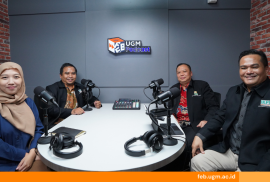Friday (29/09), the plenary session of the 8th Gadjah Mada International Conference (GAMAICI) was held at the Auditorium on the 8th floor of the Faculty of Economics and Business, Universitas Gadjah Mada (FEB UGM). GAMAICI is a conference related to topics of Islamic economics and business organized by the Center for Islamic Economics and Business Studies (PKEBS) at FEB UGM. Titled “Sustainable Development through Islamic Finance: Opportunities and Challenges in Accounting, Business, and Economics,” this plenary session featured two speakers: Prof. Habib Ahmed (Professor and Sharjah Chair in Islamic Law and Finance at Durham University) and Dr. Imam Teguh Saptono (Vice Chairman I of the Indonesian Waqf Board), moderated by M. Akbar F. A., S.E., M.Sc., a lecturer at the Department of Accounting, FEB UGM.
Islamic Finance and Sustainability: Synergies and Innovation
The urgency of implementing Sustainable Development Goals (SDGs) has increased in recent years. These goals are also reflected in Indonesia’s Vision 2045 and the Indonesian Islamic Economic Masterplan for 2019–2024. However, Indonesia is far behind in achieving these SDGs targets. Out of the seventeen SDG points, Indonesia has not attained any, ranking 75th out of 166 countries in terms of SDG achievements.
To achieve the SDGs targets, developing countries need an additional $4 trillion in funding. Specifically, Indonesia needs $4.7 trillion to achieve the SDGs. Various development sectors require financing to achieve desired goals, such as financial stability, infrastructure development, financial inclusion, social impact, and sustainable funding.
The question arises: what is the contribution of Islamic finance to SDGs? Islamic principles align with sustainable development, yet Islamic finance practices do not fully support sustainability. Therefore, innovation is needed to bridge this gap. One way to do this is through the development of Sharia-based products that meet legal, ethical, and Maqasid al-Shariah requirements – products that are halal and tayib.
Maqasid al-Shariah also reflects ethical values that must be implemented in product development, including justice and transparency. Ethics are also manifested by creating environmentally sustainable production processes. Thus, Islamic finance has the opportunity to create business innovations that contribute to sustainable development or embody SDGs.
Enhancing Waqf Sustainability: Innovative Approaches, Strategies, Future Trends, and Prospects
Geopolitical conflicts, pandemics, and climate change have created a global economic crisis. However, Islamic economics offers a system that can solve this crisis: ZISWAF, which stands for zakat, infaq, sedekah, and waqf. Specifically, the instrument discussed in this session is waqf. Waqf has significant potential in Indonesia’s economy, with an average annual growth rate of six percent. Currently, there are 440,512 waqf land locations in Indonesia, including mosques or prayer rooms, educational institutions, cemeteries, and other social needs. Additionally, the value of cash waqf reaches $1.7 trillion.
In the past, waqf faced various issues in Indonesia, including societal paradigms, infrastructure, organizations, regulations, and the products of waqf itself. However, recent developments have shown positive progress. For example, core waqf principles and cash waqf-linked sukuk instruments were launched during a meeting between the International Monetary Fund and the World Bank in 2018.
Waqf’s progress can be seen from various aspects. Wakif, the individuals who donate waqf, has expanded across different demographics, from young to old generations. Additionally, the forms of waqf assets, once dominated by waqf land, have diversified into cash waqf, waqf stocks, insurance, and flexible copyright forms. Regarding contracts, the digital ecosystem has made transactions easier, transparent, and accountable.
Moreover, waqf can be a means to achieve economic goals. It can generate government revenue, preventing budget deficits. In terms of development, waqf reduces poverty rates and enhances income redistribution. Furthermore, waqf is an essential component to drive economic growth in the country. Considering the trends and potential of waqf, it needs to be developed to utilize its potential in the future.
Reportage: Rizal Farizi





